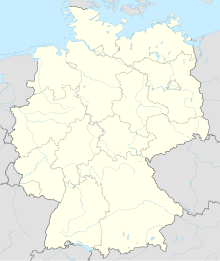Emslandlager Aschendorfermoor
Coordinates: 53 ° 1 '48.7 " N , 7 ° 23' 48.9" E
The Emslandlager Aschendorfermoor , also called Camp II, was a National Socialist prisoner camp that was established in April 1935. It was located in what is now the Aschendorfermoor part of the city of Papenburg and was one of a total of 15 Emsland camps . It was designed for 1,000 prisoners and was originally planned as a prison camp.
The camp became particularly well known for the war crimes committed by Private Willi Herold , who in April 1945 posed as captain and had around 160 people killed.
history
1935-1945
The prisoners came from all over the German Reich and were mostly sentenced to prison terms. The camp inmates had to work in the moor . This included digging peat , draining the site and building roads and paths. In addition to long and hard work and poor care, they also had to endure physical and psychological abuse by the SA guards. On January 20, 1936, eleven prisoners tried to escape in the snowstorm at the peat shop. However, the attempt to escape failed and the refugees were caught again. One of them was killed by gunshot wounds.
In April 1937 the camp was expanded and now offered space for 1,500 prisoners. They were guarded by 300 SA and judicial officers, for whom an "amusement park" was created. From July 1937 to May 1940, all political prisoners in the Emsland camps were moved to Aschendorfermoor. This has affected approximately 2,200 prisoners over the years. The prisoners were also used as harvest workers from 1939 onwards, as too few helpers were available to collect the harvest due to the German attack on Poland .
From 1940 onwards, those convicted by the Wehrmacht courts were mainly imprisoned in Camp II . By 1942 at the latest, they made up half of all prisoners. The prisoners were accused of desertion , unauthorized removal from the troops or degradation of military strength .
From 1941 the prisoners were also used in the armaments industry.
By 1945, 237 people had died in the Aschendorfermoor prison camp as a result of poor care and mistreatment.
End of the war in 1945
In the final phase of the Second World War, between 2,500 and 3,000 prisoners were brought together in the Emsland camp Aschendorfermoor. They should be brought to safety from the approaching Allied forces.
On April 12, 1945, Private Willi Herold came to the camp and pretended to be captain of the paratroopers . He pretended that Hitler had ordered him to take over the camp. By April 18, 1945, he and his men had killed around 150 people, some of whom had previously attempted to escape. On April 18 and 19, 1945, the British Air Force shelled the camp with incendiary bombs. Another 50 people lost their lives and the camp was destroyed. One day later, Polish tank crews liberated the camp.
After 1945
After the war, Willi Herold was arrested. He was sentenced to death by a British court on August 29, 1946 . The execution took place on November 14, 1946.
The victims of his war crimes are buried in the Herbrum / Aschendorf cemetery, also known as the Herold cemetery. A plaque commemorates the victims in the cemetery.
Due to the destruction of the camp by the British Air Force, not much of the camp can be seen today. Only the "amusement park" of the guards has been partially preserved. In it there are only dilapidated seating areas and a brick post of the barrier at the entrance to the camp.
In 2019, scientists from the University of Osnabrück carried out geophysical surveys for traces in the ground on the area of the former camp . The search using geoelectrics and georadar included mass graves and structural remains, such as fences and walls.
Known inmates
- Fritz Erler , member of the resistance group New Beginning , from 1964 to 1966 chairman of the SPD parliamentary group
- Ernst Walsken , member of a resistance group in the Rhine-Ruhr area. During his imprisonment, Walsken created 100 small drawings, watercolors and paper cuts, which were later given the title "Waiting for Freedom".
- Hans Weber , resistance fighter and member of the SPD
literature
- Bernd Faulenbach , Andrea Kaltofen (ed.): Hell in the moor. The Emsland camps 1933–1945. Wallstein, Göttingen 2017, ISBN 978-3-8353-3137-2 .
- District Emsland (Ed.): The destruction of justice and humanity in the concentration and prison camps of the Emsland 1933–1945. 1986.
- LG Oldenburg, November 12, 1949. In: Justice and Nazi crimes . Collection of German criminal judgments for Nazi homicidal crimes 1945–1966, Vol. V, edited by Adelheid L. Rüter-Ehlermann, CF Rüter . Amsterdam: University Press, 1970, No. 178, pp. 535–565 Participation in the shooting of over 100 prisoners in prisoner camp II (Aschendorfermoor)
Individual evidence
- ↑ a b c d e f g h i j Esterwegen Memorial , accessed on December 12, 2011.
- ↑ a b c d e f Lager 2 Aschendorfermoor ( Memento of the original from October 5, 2007 in the Internet Archive ) Info: The archive link was inserted automatically and has not yet been checked. Please check the original and archive link according to the instructions and then remove this notice. , accessed December 12, 2011.
- ↑ Researchers are looking for mass graves in Nazi camps at ndr.de from September 5, 2019
- ↑ Hartmut Soell : Fritz Erler. Vol. 1 (International Library, Vol. 100), JHW Dietz Nachf., Berlin, Bonn-Bad Godesberg 1976, ISBN 3-8012-1100-2 , pp. 53-57.



